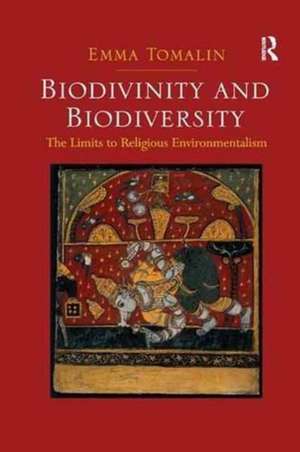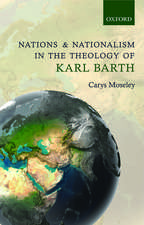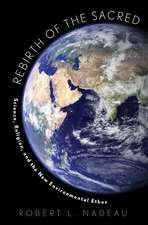Biodivinity and Biodiversity: The Limits to Religious Environmentalism
Autor Emma Tomalinen Limba Engleză Paperback – 15 noi 2016
| Toate formatele și edițiile | Preț | Express |
|---|---|---|
| Paperback (1) | 484.08 lei 6-8 săpt. | |
| Taylor & Francis – 15 noi 2016 | 484.08 lei 6-8 săpt. | |
| Hardback (1) | 1054.71 lei 6-8 săpt. | |
| Taylor & Francis – 25 iun 2009 | 1054.71 lei 6-8 săpt. |
Preț: 484.08 lei
Nou
Puncte Express: 726
Preț estimativ în valută:
92.64€ • 96.36$ • 76.48£
92.64€ • 96.36$ • 76.48£
Carte tipărită la comandă
Livrare economică 14-28 aprilie
Preluare comenzi: 021 569.72.76
Specificații
ISBN-13: 9781138265158
ISBN-10: 1138265152
Pagini: 232
Dimensiuni: 156 x 234 mm
Greutate: 0.33 kg
Ediția:1
Editura: Taylor & Francis
Colecția Routledge
Locul publicării:Oxford, United Kingdom
ISBN-10: 1138265152
Pagini: 232
Dimensiuni: 156 x 234 mm
Greutate: 0.33 kg
Ediția:1
Editura: Taylor & Francis
Colecția Routledge
Locul publicării:Oxford, United Kingdom
Notă biografică
Dr Emma Tomalin is a Senior Lecturer in the Department of Theology and Religious Studies, University of Leeds, UK.
Recenzii
'Biodivinity and Biodiversity is a critical exploration of religious environmentalism with reference to environmental practice. Covering underlying strands of thought, current discourses and situated acts in the United Kingdom and India, it will provide valuable food for thought for those working in the fields of ecology and religious studies.' Contemporary South Asia '[This book] includes important insights into the admittedly grim realities faced by environmental activists in India today.' Journal of Contemporary Religion
Cuprins
Chapter 1 Introduction; Chapter 2 The Religious Environmentalist Mode of Religion; Chapter 3 The Prehistory of Contemporary Environmentalism; Chapter 4 Environmentalisms: A Comparative Approach; Chapter 5 Religious Environmentalism and Environmental Direct Action in Britain; Chapter 6 Hinduism and the Environment: Radical to World Religions Approach; Chapter 7 Religious Environmentalism in India; Chapter 8 Conclusion;
Descriere
This book is concerned with the argument that religious traditions are inherently environmentally friendly. Yet in a developing country such as India, the majority of people cannot afford to put the 'Earth first' regardless of the extent to which this idea can be supported by their religious traditions. Does this mean that the linking of religion and environmental concerns is a strategy more suited to contexts where people have a level of material security that enables them to think and act like environmentalists? This question is approached through a series of case studies from Britain and India. The book concludes that there is a tension between the 'romantic' ecological discourse common among many Western activists and a more pragmatic approach, which is often found in India. The adoption of environmental causes by the Hindu Right in India makes it difficult to distinguish genuine concern for the environment from the broader politics surrounding the idea of a Hindu rashtra (nation). This raises a further level of analysis, which has not been provided in other studies.















